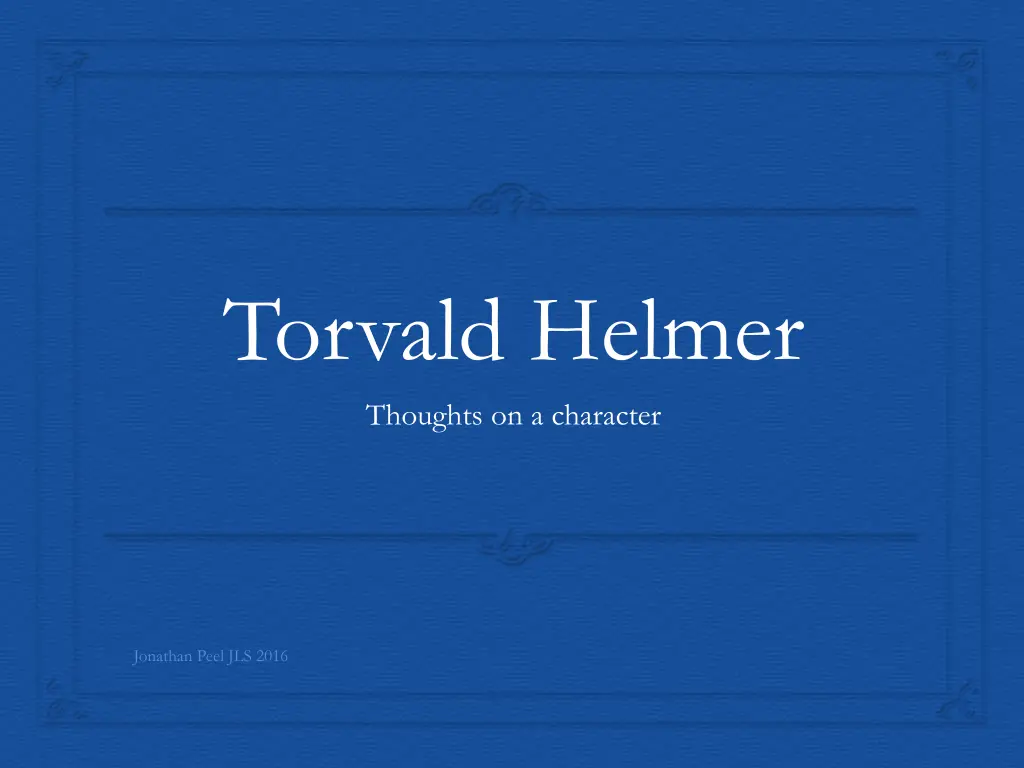
Analysis of Torvald Helmer's Character in JLS 2016 by Jonathan Peel
Delve into the complex character of Torvald Helmer as dissected by Jonathan Peel in JLS 2016. Explore Helmer's portrayal as a successful businessman, his controlling nature over Nora, tragic flaws, perceived wisdom, and struggles between being a controller or controlled.
Uploaded on | 1 Views
Download Presentation

Please find below an Image/Link to download the presentation.
The content on the website is provided AS IS for your information and personal use only. It may not be sold, licensed, or shared on other websites without obtaining consent from the author. If you encounter any issues during the download, it is possible that the publisher has removed the file from their server.
You are allowed to download the files provided on this website for personal or commercial use, subject to the condition that they are used lawfully. All files are the property of their respective owners.
The content on the website is provided AS IS for your information and personal use only. It may not be sold, licensed, or shared on other websites without obtaining consent from the author.
E N D
Presentation Transcript
Torvald Helmer Thoughts on a character Jonathan Peel JLS 2016
Positives Successful in business Able to provide security for his wife and family Obvious and reciprocal attraction to Nora Can be generous with money if the right games are played though he Is not always in the control he imagines Very hard working Represents all that is good in society Epitome of 19C male industrious and morally unimpeachable Jonathan Peel JLS 2016
Helmer and control Believes that as the Head of the Household he controls Nora. More often is controlled by her manipulation of circumstances money, macaroons, the rehearsal, the party until complete loss of control once she removes her fancy dress Consistent use of diminutive epithets to suggest Nora as potential prey Expects her to concede to him because he is her husband Act 3 don t want aren t I your husband? Jonathan Peel JLS 2016
Tragedy Does not see own hubris. Believes his moral stance to be unimpeachable and does not see any light and shade in his position Life is driven by adherence to societal rules and will never question society but will seek to conform Plays no part in Christine, Rank and Nora s discussion of the moral health of the community in Act 1 Never seeks to understand Nora s actions His focus is his reputation, not the immorality of the actions. He is utterly unaware of how petty his rationale seems to an outsider. No gratitude, as a result Jonathan Peel JLS 2016
Wisdom Sees himself as a Polonius figure the righteous father. Lectures Nora about debt, Mrs Linde about sewing as opposed to knitting Cannot be challenged (though repeatedly is): macaroons, Christian name use, tarantella and eventually Nora s education play time s over Jonathan Peel JLS 2016
Controller or controlled? Rarely sees the control: Is never told of the severity of his illness Rank protects him from seeing his death Nora removes Linde from room rather than upset him with the sight of sewing Believes it is luck that brings Linde to his door at that moment Is clearly played by Nora with regards to money Many of her lies derive from a reluctance to challenge him (macaroons) He too is a doll, protected and shielded by women and by his male friends. Jonathan Peel JLS 2016
Imagery in Act 3 In Act 3 he sees himself as a saviour: I shall watch over you like a hunted dove which I have snatched unharmed from the jaws of the falcon p96 He believes he is in the right. She has lost the miracle she has dreaded. He will never sacrifice himself to save her, instead she will be even further trapped: she has become his property in a double sense not only his wife, but also his child . His protestations of love become increasingly melodramatic and out of place towards the close of the play, as Nora develops a clarity and certainty of action. The roles are reversed. Jonathan Peel JLS 2016



